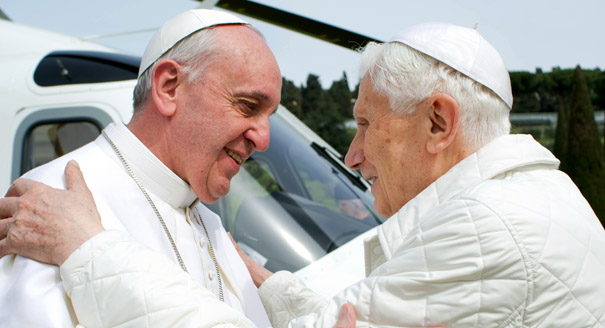A recent exchange between Robert Mickens and George Weigel provides an illustration of much that is wrong with our middle-brow conversation in the Catholic world. Mickens’ piece takes Weigel to task (not kindly, but Mickens is responding in the tone Weigel himself uses) for Weigel’s claim that “What Robert Mickens and similarly-situated Catholics are really complaining about when they say there’s been ‘no discussion’ on these issues is that they’ve lost the argument.” Weigel says (not wrongly) that these topics have been debated in the Catholic theological world constantly… but the claim that the argument is “lost” seems faulty. If so, the Church has a serious crisis, since such arguments have not convinced large swaths of practicing Catholics. Mickens is right to say that Weigel declares an argument over, instead of recognizing that it is clearly still going on. On the other hand, Mickens’ claim that these topics were a “strictly imposed litmus test for becoming a bishop” for 35 years can’t be true, or else there would be no discussion at all in a Synod, regardless of the leadership style of the Bishop of Rome. Mickens states rather baldly that issues in sexual and reproductive ethics “were treated almost as if they were articles of faith that could not be questioned, doubted or debated.” By whom? If anything, there are plenty of spaces in the Catholic world where the “articles of faith” are quite the opposite, that the Church has been wrong about many of these issues for a very long time.
In other words, here’s what’s wrong with our conversation: both men misstate the actual state of affairs by overstating their argument. Weigel claims that progressives have “lost the argument,” which is evidently a disregard not only for the actual practice of Catholics in the pews, but with the concerns raised honestly by various bishops at the Synod. Mickens claims that for 35 years, absolute fidelity has been a “litmus test” for leadership, such that any and all discussion in the Church has been silenced. Neither one of these things are true. I would posit instead that three things, from which much less self-righteous assurance can be derived, are true:
- Catholics struggle to live out the high standards of the moral life set by the universal call to holiness and often made more difficult by the prevailing culture. This is consistently true in all areas of post-Vatican-II moral and social teaching, from Humanae Vitae to Caritas in Veritate.
- Pope Francis, no less than Popes Benedict, John Paul, and Paul VI, shows no sign of somehow relaxing fundamental and difficult teachings on these issues… though the question of disciplines is much more open.
- The leadership of Francis, both in his aiming at entrenched bureaucracy and his encouraging of a genuinely collegial spirit of “synodality” (= “debate”!), is a breath of fresh air for the Church, because it allows the real concerns and arguments going on in the Church to be engaged by its leaders. It does not, however, mean we know the outcome of this discussion.
These kinds of descriptions are apparently unsatisfactory to both Weigel and Mickens. We might wonder why. A “political” explanation would be that they are more or less partisan writers in the realm of ecclesial politics, narrating events in ways that give help to their own side. This is church coverage for those who watch Fox News or MSNBC. That both columns are filled with gratuitous insults of the other sadly suggests this interpretation. The genuine knowledge and faith evident in both men’s overall work is undercut by such behavior.
A less Machiavellian answer, but one I like better, is that Weigel and Mickens, like many of us, don’t like the conclusion that should come from this narration of the facts: on the one hand, a Church with challenging ideals, and on the other, one that grapples honestly with the messy reality of being church when we fail to live out those ideals. This would be a church for non-complacent sinners. Tracey Rowland – in what is easily the best book on Benedict – suggests that a correct reading of Benedict would recognize his indictment of two sorts of “Pelagians”: the “pious Pelagians” of the Right and the “bourgeois Pelagians” of the Left. “Pious Pelagians” attempt to narrow but strictly identify the criteria for Church membership (and therefore salvation); they articulate a hard line on a restricted set of teachings, make these markers of who is a “good” Catholic, and then too often ignore everything else. “Bourgeois Pelagians” attempt to broaden the teachings in such a way that pretty much everyone is “good enough to get by” (for both church membership and salvation); they assume God cannot be too counter-culturally demanding. True, these are ideal types, but it is all too easy to see these attitudes manifest in our ecclesial debates. Benedict, the consummate German professor, may not have had the people skills to know how to help the Church embody his insight. But the insight is spot-on, and the full spectrum of Francis makes it clear that he is a man who has little use for Pelagians of any sort in practice, but rather is looking for people who are deeply rooted in a relationship with Christ who are willing to “go out” to the world and do works of genuine mercy. Not works to earn salvation; works of mercy.
The non-Pelagian church is a church of non-complacent sinners, but ones who are non-complacent because they recognize how their sin undermines their baptismal identity and mission to, as my priest said in a great homily recently, speak the words of Christ to the world in all we say and do. What’s bad about sin is not (primarily) “the fires of hell,” but the wounding of friendship with God, a wounding which undermines my ability (which is dependent on God) to do and be God’s presence in the world – and not just to be a relatively decent, nice-enough middle-class American. To live from God’s love for the world is to be aware of one’s sins, and to be aware of how those sins are the things that make it harder to be genuinely “for the world.”





I appreciate the points about Pelagianism in its various manifestations. The common thread in it is gracelessness. Perhaps that is why Pope Benedict placed so much emphasis on the principle of “gratuity” in Caritas in Veritate, a Catholic spirituality is viable only if we all start from the premise that to know Christ in the midst of the Church is purely a gift. He offers the gift lavishly, and He asks us to help each other keep it intact. The latter part is made less arduous, or at least less combative, if we remember that our ability to both help and be helped by another is a further manifestation of grace. Ah well, it’s a thought anyway. Thanks for the post.